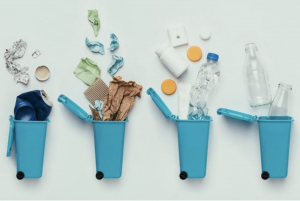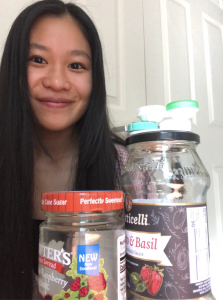
The Spectrum for Adopting a Zero Waste Lifestyle During College
By: Michelle Ly, Senior in Emory College, Neuroscience and Behavioral Biology Major

Over the past almost four years learning to be zero waste at college, I’ve realized the zero waste lifestyle lies on a spectrum (now more than ever with the current pandemic). While the term itself is on one extreme end of the spectrum, being ZERO waste, this lifestyle is about making choices to reduce the most waste you can within your living circumstances. Although it’s great to care about reducing waste, it’s important to recognize it’s a privilege to have the choice, capacity, and resources needed to make a change. In transitioning between living at home and living at college, I’ve found a balance with a low waste lifestyle, where I strive for progress over perfection in aiming to reduce my waste when possible. Here are three ideas that have helped me along my journey, which I hope anyone hoping to have a lifestyle on the zero waste spectrum will be able to adapt for themselves:
Rethink your perspective. Social media can misleadingly imply that a zero waste lifestyle may require attaining pretty mason jars, reusable cups, and other items you need to buy to live zero waste. You do not need to buy bamboo cutlery or metal containers to reduce your plastic waste or care about the environment. Use what you have first. Wrap regular silverware in a cloth or reuse plastic takeout containers or tupperware you already have in your home. Don’t let the media influence you into what zero waste means for you and your life!
Reduce your consumption. Before buying anything, I always ask myself if it will add value to my current life. This helps me figure out if my decisions are impulsive or not. I also like to adopt a traveler’s mindset for living a low waste lifestyle. When we travel, we take only what we need for the journey, so we feel lighter and more flexible. This has been especially helpful when I need to move back into my college dorm and find myself wanting to buy all types of decor or bring my whole closet. Lastly, considering the full costs of a purchase has also helped me face my consumption tendencies. Instead of just looking at the sticker price, I’ve made it a habit to consider the time and energy expenses it’ll take to maintain or fix whatever I’m considering buying. 
Repurpose old materials. I personally love to reuse empty jam jars as cups in coffee shops and pasta sauce jars for bulk pantry and food containers, but the possibilities are endless. My favorite repurpose is using my contact lens cases as containers to organize my jewelry (necklaces will never be tangled and earrings will never be lost again). In my house, my family has a drawer full of plastic bags collected over the years. We’ve reused these plastic bags for pet waste, trash bins, the grocery store, and we keep some in the car in case of emergencies. Overall, repurposing old materials is an incredible way to reduce your waste that also allows you to be creative!
Remember that living a completely zero waste lifestyle is an extreme, if not an ideal, during college. Let it motivate you to reduce waste. Don’t be discouraged when waste is still produced, what matters are your intentions!
Image credit: https://www.moneylogue.com/live-zero-waste-lifestyle/
